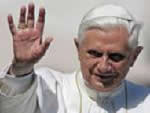|
Pope Benedict XVI- Angelus |
 Angelus
Message
Angelus
Message
On Lazarus and World Hunger
"He Who Is Forgotten by All Is Not Forgotten by God"
H.H. Benedict XVI
September 30, 2007
www.zenit.org
Dear Brothers and Sister!
Today, the Gospel of Luke presents the parable of the rich man and
poor Lazarus (16:19-31). The rich man embodies the unjust spending
of wealth by those who use it for unbridled and egotistical luxury,
thinking only of satisfying themselves, without taking care of the
beggar at their door.
The poor man, on the other hand, represents the person that only God
cares for, and unlike the rich man, he has a name, Lazarus, an
abbreviation of Eleazar, which means “God helps him." He who is
forgotten by all is not forgotten by God; he who is worth nothing in
the eyes of men, is precious in the eyes of the Lord.
The story shows how earthly injustice is overturned by divine
justice: After death, Lazarus is welcomed “into Abraham’s bosom,"
that is to say, into eternal beatitude, while the rich man ends up
“in hell among torments." It is a new, definitive, unappealing
state. Therefore it is during this life that one must repent; doing
so afterward is useless.
This parable also lends itself to a social interpretation. Paul VI’s
encyclical “Populorum Progressio," written 40 years ago, remains
memorable. In speaking about the fight against hunger, he writes:
“It involves building a human community where men can live truly
human lives … where the needy Lazarus can sit down with the rich man
at the same banquet table” (No. 47).
The cause of the numerous situations of misery are -- according to
the encyclical -- on the one hand, "servitude to other men” and on
the other, “natural forces which they cannot yet control
satisfactorily” (ibid).
Unfortunately, certain peoples suffer from both of these forces. How
can we not think, especially in this moment, of the countries in
sub-Saharan Africa, stricken with serious flooding over these last
few days?
But we cannot forget many other situations of humanitarian emergency
in various regions of the planet, in which battles for political
power lead to the worsening of environmental problems already
weighing on the people. The appeal Paul VI gave voice to back then:
“The hungry nations of the world cry out to the peoples blessed with
abundance” (“Populorum Progressio," No. 3), has the same urgency
today.
We cannot say that we do not know the road to take: We have the law
and the prophets, Christ tells us in the Gospel. Whoever chooses not
to listen would not change even if someone came back from the dead
to warn him.
May the Virgin Mary help us to take advantage of the present time to
listen and to put into practice this word of God. May she make us
attentive to our brothers in need, to share with them the abundance
or the little that we have, and to contribute, beginning with
ourselves, to the spreading of the logic and style of authentic
solidarity.
[After praying the Angelus, the Holy Father addressed the pilgrims
gathered at Castel Gandolfo, saying:]
I follow the serious events taking place in Myanmar with great
trepidation and I wish to express my spiritual closeness to that
dear people in this moment of sorrowful difficulty that they are
experiencing. While guaranteeing them my intense prayer and support,
I invite the entire Church to do the same and I hope that a peaceful
solution can be found, for the good of the country.
I recommend the situation of the Korean peninsula to your prayers,
where important developments in the dialogue between the two Koreas
are a hopeful sign that the efforts of reconciliation in act can
consolidate in favor of the Korean people and to benefit the
stability and peace of the entire region.
[Translation by ZENIT]
[To the English-speaking pilgrims he said:]
I greet all the English-speaking pilgrims and visitors present at
today’s Angelus, including members of the Acton Institute, and
administrators and benefactors of Seton Hall University. Today’s
Gospel reading reminds us to be generous with the good things we
receive in life. In this spirit, may your visit to Castel Gandolfo
and Rome be a time filled with thanksgiving and renewed love of the
universal Church. Upon you and your families, I invoke the joy and
peace of Christ the Lord!
© Copyright 2007 -- Libreria Editrice Vaticana
This page is the work of the Servants of the Pierced Hearts of Jesus and
Mary